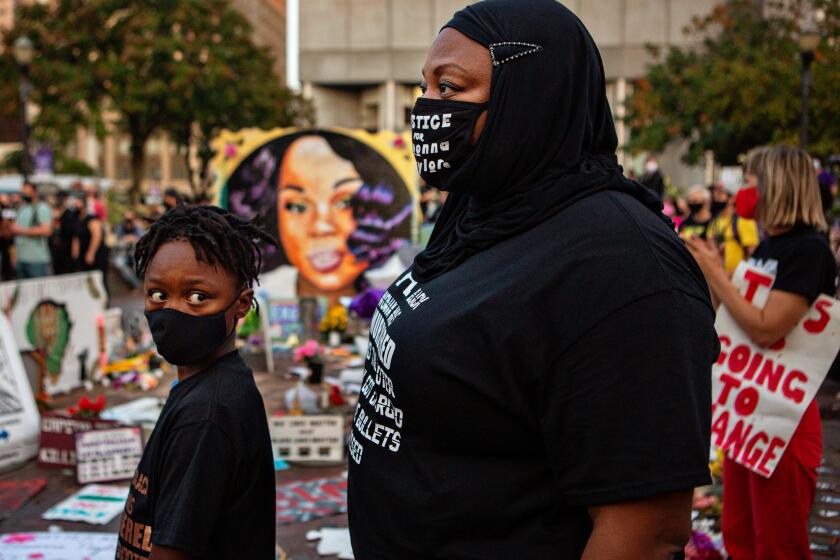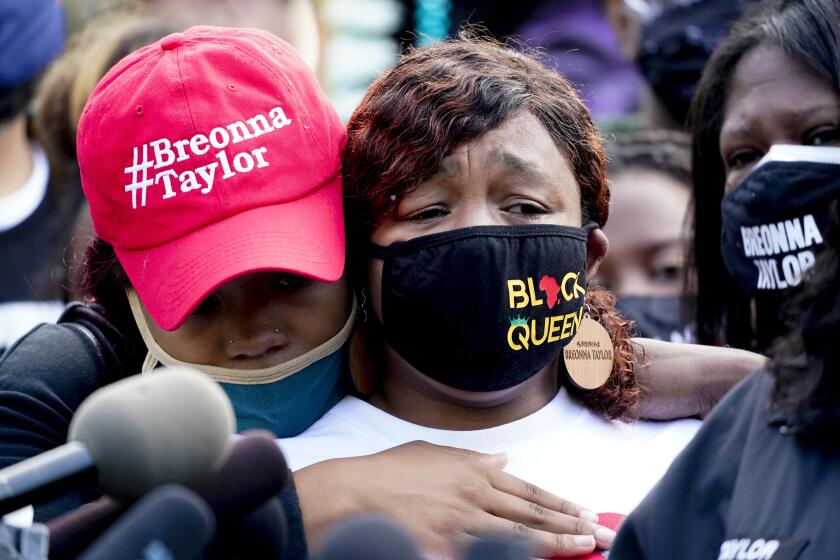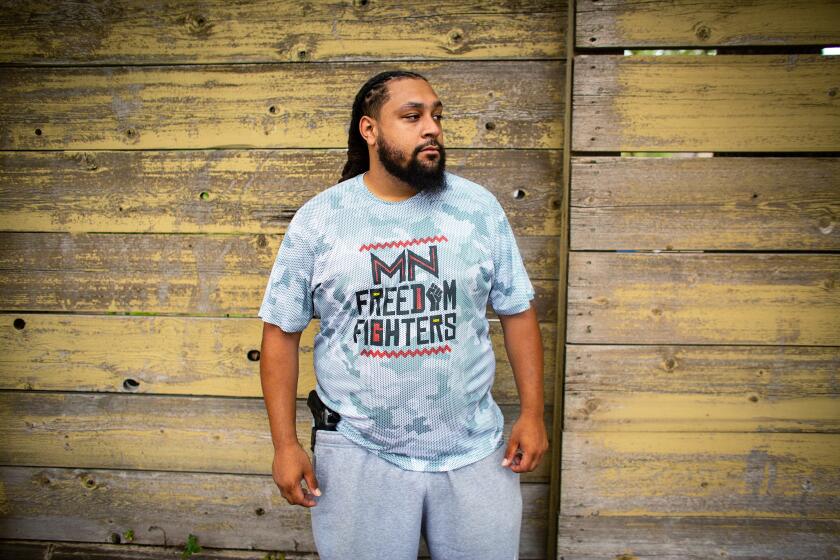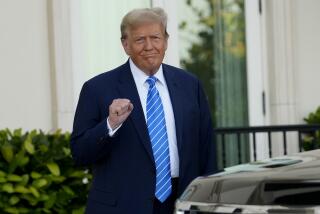Kentucky attorney general is granted a delay in releasing Breonna Taylor grand jury documents
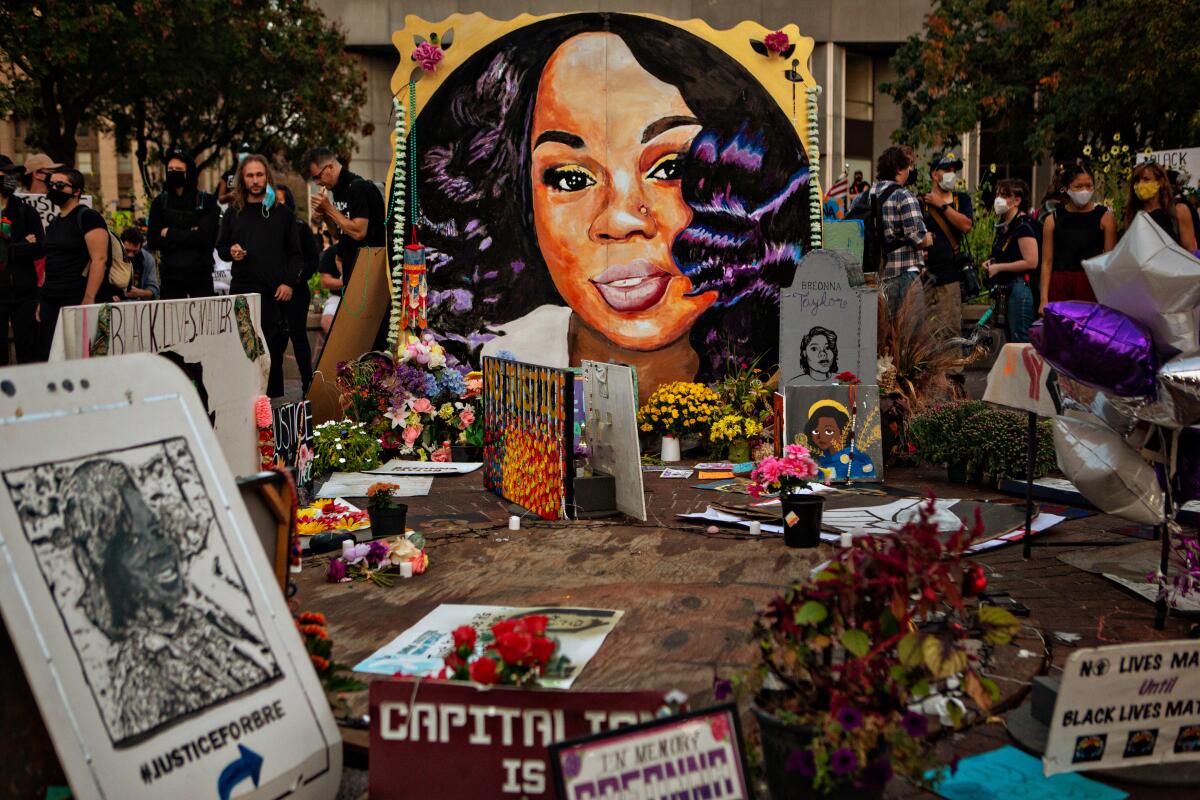
- Share via
LOUISVILLE, Ky. — A judge granted a motion filed by Kentucky Atty. Gen. Daniel Cameron on Wednesday to delay the release of transcripts and audio from a grand jury’s inquiry into the police killing of Breonna Taylor.
It’s the latest legal turn in a case that has helped propel the national discourse about race and policing.
Cameron, who filed a motion early Wednesday, asked for a one-week delay so that his office could redact the personal information of people who were part of the proceedings. The circuit court judge, Ann Bailey Smith, granted a delay until Friday for the documents from the 2½ days of proceedings.
Normally kept secret, the documents and audio recordings were set to be made public after an unidentified grand juror filed a separate court motion this week asking a judge to release the record of the proceedings.
The motion filed by the juror argued that there was a “compelling public interest” to have the grand jury record released. In addition, it accuses Cameron, who was also the special prosecutor in the case, of “using the grand jury to deflect accountability and responsibility for [the indictment] decisions.”
Last week, Cameron announced the grand jury’s decision not to hold the three officers — Myles Cosgrove, Jonathan Mattingly and Brett Hankison — involved in the shooting legally responsible for the killing of Taylor, a 26-year-old Black woman, in Louisville. The decision stirred outrage across the country. Cameron disclosed this week that his office had not given the panel the option to consider murder or lesser charges in Taylor’s death.
Many Black residents of Louisville, Ky., are sadly familiar with marginalization and otherness, and have watched a system that vows to uphold justice fall short of its promise.
A Jefferson County circuit court judge ruled in favor of the motion to make public a record of the grand jury’s deliberations, and Cameron has said he will comply by releasing documents from the proceedings.
Officers burst into Taylor’s apartment March 13 with a “no knock” warrant and fired multiple times after her boyfriend, Kenneth Walker — who did not know who was entering the home — shot and wounded one of the officers. Taylor, who had been sleeping at the time, was shot multiple times and died instantly.
Hankison, since dismissed from the Louisville Metro Police Department, was charged by the grand jury with wanton endangerment for firing rounds that struck neighboring apartments — a legal determination, critics say, that served as a further insult to the value of Taylor’s life.
In an interview with a local news station late Tuesday, Cameron defended the decision not to give the grand jury the option of recommending murder or lesser charges, saying it was “not appropriate.”
“The charge that we could prove at trial, beyond reasonable doubt, was for wanton endangerment against Mr. Hankison,” Cameron said. “Myles Cosgrove and Jonathan Mattingly were fired upon by Mr. Walker. They were justified in returning fire.”
In the days since the announcement, attorneys for Taylor and for Kentucky Gov. Andy Beshear, a Democrat, have called on Cameron to release the transcripts amid more than 120 days of protests that have shuttered the city. The largely peaceful demonstrations have served as a relentless rally against police brutality toward Black people.
Breonna Taylor’s mother says her daughter was failed by a lack of adequate investigation into the fatal shooting by Louisville police officers.
On Wednesday afternoon, Jackie Reynolds, a local college student, sat on a sidewalk near Jefferson Square Park in downtown Louisville, the site of massive demonstrations in recent months. She has been among those protesting.
“In time, the truth will come out,” Reynolds said, noting she is not concerned about the delay in releasing the grand jury transcripts. “We’re not going to stop marching until these officers are charged with murdering Breonna.”
Reynolds was among nearly a dozen other protesters in the park, where a large mural in honor of Taylor is located.
Benjamin Crump, a civil rights attorney representing Taylor’s family, said that “since the grand jury decision was announced, we’ve been saying that Daniel Cameron clearly failed to present a comprehensive case that supported justice for Breonna.
“That conclusion is supported by the grand juror who came forward to say that the attorney general misrepresented the grand jury’s deliberations,” Crump said.
He added: “In America, law-abiding citizens — including Black citizens — have the right to live peacefully in their homes, without police breaking down their doors in the middle of the night, and they have a right to protect themselves and their property from intruders.”
Armed Black groups like the Minnesota Freedom Fighters work to protect the streets as calls for racial justice mount.
Cameron, the state’s first Black attorney general, has faced criticism from some Black activists here.
“You are a coward, you are a sellout,” Tamika Mallory, a leading activist, said of Cameron during a news conference last week.
In the local television interview, Cameron responded to criticism of how he has handled the case.
“Some of these folks, they seek to divide and push hatred … and to stir the pot,” he said. “Just because I might have a different philosophy should not discredit the fact I am a Black man.”
Since Taylor’s death six months ago, the city has sought to implement changes and ease tensions.
Local elected officials have enacted a ban, known as Breonna’s Law, on “no knock” warrants like the one officers used to force their way into her residence. The city is also creating an independent civilian police-review board with subpoena power, designed to foster greater accountability and transparency within the Police Department.
Earlier this month, the city settled a wrongful-death lawsuit with Taylor’s family for $12 million, the highest amount ever paid out by the city in a case of its kind.
More to Read
Sign up for Essential California
The most important California stories and recommendations in your inbox every morning.
You may occasionally receive promotional content from the Los Angeles Times.
